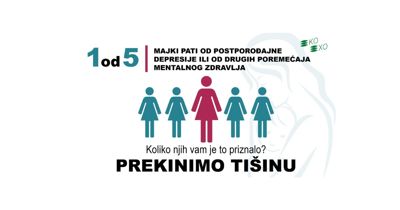
Postpartum depression is one of the most common and severe forms of mental health disorders that women can experience after childbirth. Although it is estimated that one in five mothers worldwide faces this issue, Bosnia and Herzegovina still lacks a systematic approach to early detection and treatment of this condition. The association EKO EHO – Center for Education and Promotion of Healthy Living, in cooperation with partner organizations – the Association for Education and Development “Dignitet” Mostar, the Association of Families Facing Infertility “Bebe” Trebinje, and the Association of Active Women “Gender” Brčko – and with the support of the PRAGG project, is advocating for the introduction of regular and mandatory screening for postpartum depression in healthcare institutions across the country.
Their efforts are focused on engaging key decision-makers at all administrative levels in Bosnia and Herzegovina.
“Our goal is to engage the Ministry of Health and Social Welfare of Republika Srpska, the Federal Ministry of Health, and the Department of Health of the Brčko District Government, as their support is essential for institutionalizing the screening. The Ministry of Health and Social Welfare of Republika Srpska has revised the Methodological Guidelines for postpartum depression screening, based on recommendations and experiences from previous screening implementations. Additionally, the Program for the Promotion of Citizens’ Mental Health for the period 2025–2027, along with its Action Plan, is currently being developed. The adoption of these documents is expected soon. With their adoption, screening will once again become a mandatory activity in all health centers in Republika Srpska. Meetings have also been held with representatives of the Department of Health of the Brčko District Government, who have expressed willingness and readiness to introduce screening. Workshops were held with healthcare workers and parents in the Brčko District, who also showed interest in the topic and confirmed through their experiences the need for postpartum depression screening to become part of the healthcare system and regular practice in the district’s institutions. Furthermore, continued negotiations with the government representatives are expected in the coming period to identify appropriate models and develop the necessary documentation to regulate the implementation of screening. The Federal Ministry of Health has also shown readiness, and we expect concrete implementation of some of the proposed measures presented during initial meetings,” stated EKO EHO.
Further development of the initiative depends on cooperation with health insurance funds and relevant ministries at all levels of government and must be tailored to BiH’s complex administrative structure. Several key meetings are planned for June, which could open the door to concrete institutional implementation of screening within public healthcare systems nationwide. EKO EHO emphasizes that these steps are crucial to move from advocacy to implementation:
“So far, initiatives have been submitted to the relevant institutions in Republika Srpska and Brčko District. In Republika Srpska, a meeting has been scheduled with representatives of the Health Insurance Fund for June 4. As mentioned, planned workshops were held with healthcare professionals and parents in the Brčko District. In the coming days, we plan to submit the conclusions from the workshops to the Brčko District Government and to continue discussions and meetings on the legislative framework that would regulate the introduction of screening in the district. The next meeting in the Federation of BiH is scheduled for June 3 with representatives of the Federal Ministry of Health and the Parliamentary Health Committee. Following the meeting, we plan to submit the initiative.”
As the optimal model for introducing postpartum depression screening into the healthcare system, EKO EHO advocates for its implementation within family medicine, pediatrics, and gynecology – a practice that, they note, is standard in many countries around the world.
“This approach is the most commonly used globally because it allows us to reach a larger number of women and increases the likelihood that those experiencing changes in mental health after childbirth will be identified in time,” they explain.
In conclusion, EKO EHO emphasizes that postpartum depression is a topic that requires systemic attention and long-term investment in women’s mental health.
“Postpartum depression is serious, common, but treatable. That is why it is crucial that screening for postpartum depression becomes part of the healthcare system throughout BiH as a preventive tool. Every woman deserves support and care for her mental health during one of the most vulnerable periods of her life. If our society truly understood the importance of supporting mothers during pregnancy and the early years of a child’s life, we would soon have much happier and more fulfilled generations.”






